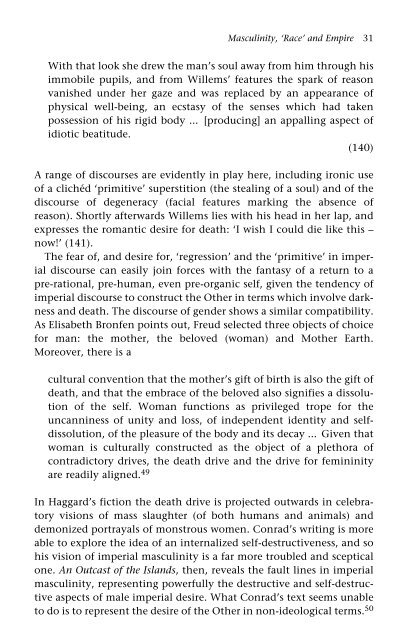Conrad and Masculinity
Conrad and Masculinity
Conrad and Masculinity
Create successful ePaper yourself
Turn your PDF publications into a flip-book with our unique Google optimized e-Paper software.
<strong>Masculinity</strong>, ‘Race’ <strong>and</strong> Empire 31<br />
With that look she drew the man’s soul away from him through his<br />
immobile pupils, <strong>and</strong> from Willems’ features the spark of reason<br />
vanished under her gaze <strong>and</strong> was replaced by an appearance of<br />
physical well-being, an ecstasy of the senses which had taken<br />
possession of his rigid body ... [producing] an appalling aspect of<br />
idiotic beatitude.<br />
(140)<br />
A range of discourses are evidently in play here, including ironic use<br />
of a clichéd ‘primitive’ superstition (the stealing of a soul) <strong>and</strong> of the<br />
discourse of degeneracy (facial features marking the absence of<br />
reason). Shortly afterwards Willems lies with his head in her lap, <strong>and</strong><br />
expresses the romantic desire for death: ‘I wish I could die like this –<br />
now!’ (141).<br />
The fear of, <strong>and</strong> desire for, ‘regression’ <strong>and</strong> the ‘primitive’ in imperial<br />
discourse can easily join forces with the fantasy of a return to a<br />
pre-rational, pre-human, even pre-organic self, given the tendency of<br />
imperial discourse to construct the Other in terms which involve darkness<br />
<strong>and</strong> death. The discourse of gender shows a similar compatibility.<br />
As Elisabeth Bronfen points out, Freud selected three objects of choice<br />
for man: the mother, the beloved (woman) <strong>and</strong> Mother Earth.<br />
Moreover, there is a<br />
cultural convention that the mother’s gift of birth is also the gift of<br />
death, <strong>and</strong> that the embrace of the beloved also signifies a dissolution<br />
of the self. Woman functions as privileged trope for the<br />
uncanniness of unity <strong>and</strong> loss, of independent identity <strong>and</strong> selfdissolution,<br />
of the pleasure of the body <strong>and</strong> its decay ... Given that<br />
woman is culturally constructed as the object of a plethora of<br />
contradictory drives, the death drive <strong>and</strong> the drive for femininity<br />
are readily aligned. 49<br />
In Haggard’s fiction the death drive is projected outwards in celebratory<br />
visions of mass slaughter (of both humans <strong>and</strong> animals) <strong>and</strong><br />
demonized portrayals of monstrous women. <strong>Conrad</strong>’s writing is more<br />
able to explore the idea of an internalized self-destructiveness, <strong>and</strong> so<br />
his vision of imperial masculinity is a far more troubled <strong>and</strong> sceptical<br />
one. An Outcast of the Isl<strong>and</strong>s, then, reveals the fault lines in imperial<br />
masculinity, representing powerfully the destructive <strong>and</strong> self-destructive<br />
aspects of male imperial desire. What <strong>Conrad</strong>’s text seems unable<br />
to do is to represent the desire of the Other in non-ideological terms. 50




